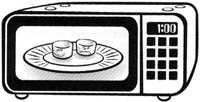|


In the microwave, an ordinary marshmallow will puff up until it’s
enormous!
|
 CAUTION
CAUTION
Kids, please don’t try this without the help of an adult.
|
|
What
Do I Need?
|
.
|
|
•
marshmallows
|
 Did
You Know?
Did
You Know?
Ancient Egyptians made a puffy white treat out of honey and the
dried, carrot-shaped root of the marsh mallow plant, which grows
in fields and swamps. Today we still call these candies marshmallows,
but now they’re made with sugar and gelatin. Marsh mallow root
is still used to make some kinds of glue.
|
|
•
paper plates or paper towels
|
|
•
microwave
oven
|
|
•
toothpicks
(if you want)
|
|
•
food coloring (if you want)
|
|
|
|
|
What
Do I Do?
|
|
|
1.
Put
two marshmallows on a paper plate or paper towel.
|
 Tip
Tip
DON’T microwave a marshmallow for more than 2 minutes. It
will just turn dark brown and make a stinky, sticky mess.
 Share
& Discuss
Share
& Discuss
How big did your marshmallows get? Measure them and
send
us a photo
of your marshmallow!
|
|
|
|
2.
Put
the plate in the microwave. Set the timer for 1 minute (60 seconds)
on high.

|
|
|
|
3.
Stand
back and watch through the window of the microwave. After about
20 seconds, you’ll see the marshmallows start to puff up.
They’ll grow to about four times their original size!
|
|
|
|
4.
When
the microwave turns off, take the plate out and put it on the
counter.
|
|
|
|
5.
Wait
a few seconds, then pull one marshmallow off. Is the marshmallow
hollow inside? Is the inside the same color as the outside? When
you eat it, is it soft or crunchy?

|
|
|
|
6.
Leave
the other marshmallow on the plate and watch it for a minute.
When it shrinks back down, you can pull it with your fingers and
make it into whatever shape you want. It will stay in that shape
and get hard and crunchy. You can eat it, too.
|
|
|
|
|
What’s
Going On?
|
.
|
|
 Marshmallows
are mostly sugar and water wrapped around a bunch of air bubbles.
When you cook marshmallows in your microwave oven, several things
happen at once. The microwave makes the water molecules vibrate
very quickly—which makes the water heat up. The hot water
warms the sugar, which softens a little. The hot water also warms
the air bubbles.
Marshmallows
are mostly sugar and water wrapped around a bunch of air bubbles.
When you cook marshmallows in your microwave oven, several things
happen at once. The microwave makes the water molecules vibrate
very quickly—which makes the water heat up. The hot water
warms the sugar, which softens a little. The hot water also warms
the air bubbles.
When
you warm air in a closed container, the gas molecules move around
faster and push harder against the walls of the container. As
the air in the bubbles warms up, the air molecules bounce around
faster and faster and push harder against the bubble walls. Since
the sugar walls are warm and soft, the bubbles expand, and the
marshmallow puffs up. If it puffs up too much, some air bubbles
burst, and the marshmallow deflates like a popped balloon.
When
you take the marshmallow out of the microwave and it cools off,
the bubbles shrink and the sugar hardens again. When the microwave
marshmallow cools, it’s dry and crunchy. We think that’s
because some of the water in the marshmallow evaporates when the
marshmallow is hot.
If
you cook your marshmallow for too long, it turns brown or black
inside. That happens when the sugar gets so hot that it starts
to burn.
|
|
|
|
|
|
What
Else Can I Try?
|
.
|
|
•
Expand-a-Face:
Dip a toothpick into food coloring and draw
a face on your marshmallow before you put it in the microwave.
As the marshmallow puffs up, the face will get bigger and bigger.
•
In the springtime, it’s fun to expand marshmallow chicks
and bunnies instead of regular
marshmallows.

|
This
activity is from the Exploratorium publication, The
Science Explorer.
|
|
 Share
& Discuss
Share
& Discuss
Share
the results of your marshmallow experiments.
|
|
-
- -
Candy Home Page
-
- -
Kitchen Lab
-
- -
|